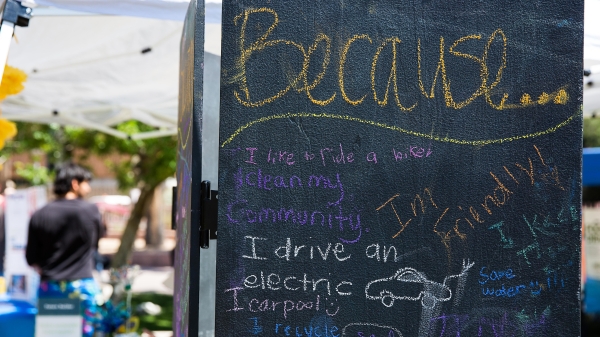Sustainable Phosphorus Alliance hosts first conference

Attendees heard from leading scientists on the latest studies concerning phosphorus pollution and participated in panel discussions regarding key issues around sustainable uses of the precious element.
As agribusiness grows to feed an increasing global population, so do concerns about the sustainability of current agricultural practices.
The use of phosphorus in big agriculture is one such practice that has come under the microscope of sustainability experts. The element is a common ingredient in plant fertilizer and animal feed and is an essential building block for life, however, an overabundance of phosphorus can leak toxins into the environment.
Researchers have long been aware of the environmental issues that phosphorus waste causes, but it has been difficult to get a handle on them because the issues occur at every point on the phosphorus supply chain.
“It is somewhat analogous to the problems with carbon dioxide pollution. There is pollution at every step and in order to deal with it effectively you have to get everyone at the table,” said Matthew Scholz, a sustainability scientist and the program manager of the newly formed Sustainable Phosphorus Alliance (SPA).
The SPA's first conference, "Phosphorus Forum 2017" hosted in Washington D.C. on May 19, drew more than 100 individuals and 70 organizations. It is sponsored by the National Science Foundation and its member organizations. They come from across the phosphorus value chain from mining companies to crop consultants, agricultural retailers, wastewater treatment plants and animal feeding operations.
Attendees heard from leading scientists on the latest studies concerning phosphorus pollution and participated in panel discussions regarding key issues around sustainable uses of the precious element. Scholz's goal for the conference is to get the word out that they are here and ready to bring all interested parties to the table for collaboration.
The “pollution supply chain,” as Scholz likes to call it, begins with the phosphorus mines. The mines generate phosphorus waste, which is left to be washed away and eventually infiltrates our ground water. Processed phosphorus is then added directly to our soil through fertilizer or indirectly through livestock waste. This too eventually filters into our waterways, polluting them with toxins.
There is also a secondary effect of high levels of phosphorus in our water. It can feed algal blooms and lead to a dangerous process called eutrophication, where the algae become so prevalent that it exhausts the oxygen content of a body of water, resulting in the death of animal life within that body of water. The rotting organisms lead to an explosion of bacteria and other health hazards.
Scholz and the SPA are working to bring together a diverse group of stakeholders in the phosphorus and agribusiness industries to set better standards for sustainable use of the element.
“We are moving from the research phase into the implementation of real world solutions for phosphorus sustainability issues,” he said. “We hope to improve phosphorus sustainability by advancing measures that improve the efficiency of its use, that recovers it after use to prevent pollution, and that recycle it for repeated use.”
The SPA wants to make the Phosphorus Forum an annual conference with a goal of launching task forces to aide in the cross cross-pollinationeas across different points of the phosphorus value chain.
Written by Gavin Maxwell/ASU
More Environment and sustainability

Earth Day celebrations focus on making our planet a priority
On April 22, Earth Day is celebrated across the country and in nearly 193 countries around the world. Arizona State University…

ASU scientist studies how bans, regulations on food technology affect consumer acceptance, perceptions
How do people process scientific developments with outside influences, warnings, biases and others’ opinions filtering in? That…

ASU team's research leads to new law protecting mobile-home dwellers
Arizona Gov. Katie Hobbs signed a law earlier this month that guarantees mobile-home owners’ right to install cooling measures,…
